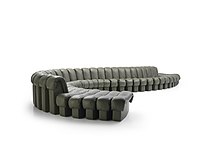De Sede
| de Sede AG
|
|
|---|---|
| legal form | AG |
| founding | 1965 |
| Seat | Klingnau, Switzerland |
| management | Monika Walser, CEO |
| Number of employees | 109 (February 7, 2018) |
| Branch | Furniture |
| Website | www.desede.ch |
de Sede is a Swiss furniture and leather accessories manufacturer based in Klingnau , Switzerland . The company produces around 11,000 pieces of furniture, mostly hand-made, every year. 70% of the products are exported to 48 countries, with all production located in Switzerland.
Monika Walser , former head of the bag label Freitag , has headed de Sede AG since 2014. The main investor is Oel Pool AG, with Daniel Sieber as the main shareholder.
The furniture is sold through dealers worldwide as well as in the showroom in Klingnau and in the showroom in Los Angeles , which opened in 2017 .
Products
The de Sede collection consists of sofas, armchairs, loungers, stools, benches, tables, beds and outdoor furniture. In addition, de Sede AG has been producing its own leather bag collection since September 2017, which is completely manufactured in the Klingnau plant.
history
de Sede has its origins in a saddlery, which was founded in 1962 by the master saddler Ernst Lüthy in Klingnau. His team specialized in leather furniture, made by hand. In 1965 the family business was converted into a stock corporation, de Sede AG. Designers with an international stature were brought in to create the seating furniture and additional production facilities were opened, and an international sales network was established. The brand became world-famous through acquisition and innovative ideas.
In 1984 it was taken over by the PCW Group, in 1993 Hans-Peter Fässler took over the company together with a partner through a management buyout. In 2000, under Hans-Peter Fässler, the company FSM Frank Sitzmöbel was bought, which is still part of de Sede AG today. In 2007, Hans-Peter Fässler sold the company to the private equity house Capvis, which merged it into the de Sede Group together with the furniture companies Machalke (Germany) and Wellis AG (Switzerland). In 2013, seven private Swiss investors founded DESEMA Holding AG and integrated de Sede AG and Machalke Polsterwerkstätten GmbH into it, each with its own management team. In 2014 Monika Walser took over the management of de Sede AG with the brands de Sede and FSM. In 2015 Oel-Pool became an investor and still carries 90 percent of de Sede, 10 percent belongs to Monika Walser.
Design history
Kurt Thut
In 1956, Kurt Thut designed the KT-221 sofa, which the Klingnau-based company carefully refreshed for its 50th anniversary in 2015 and then relaunched.
Alfredo Häberli
The Swiss designer Alfredo Häberli, born in Argentina, designed the DS-373 model series for de Sede. He found his inspiration in a small leather elephant that he discovered at a flea market. He was fascinated by the three-dimensional toy, which was folded from a two-dimensional piece of fabric. So he took it to a meeting with the company, put it on the table and said, "I want to make a sofa like this."
Stephan Hürlemann
The Swiss architect Stephan Hürlemann designed the DS-21 model for de Sede in 2016. The design is based on a modular structure with a strict base and upholstered cubes that can be exchanged so that both the shape and the appearance of the furniture can be changed flexibly.
Ueli Berger, Eleonore Peduzzi Riva, Heinz Ulrich, Klaus Vogt
DS-600 was designed by Ueli Berger, Eleonora Peduzzi-Riva, Heinz Ulrich and Klaus Vogt. The autodidact Ueli Berger (1937–2008) worked as a painter, sculptor, draftsman and designer, often architecture-related, since 1962. Eleonore Peduzzi Riva has worked as an artist and designer in architecture, interior design and furnishing as well as in research and production in the field of industrial design. After completing his apprenticeship as a structural draftsman and graduating from the specialist class for interior architecture and product design at the Zurich School of Applied Arts, Heinz Ulrich (* 1942) was the head of the furnishings company for Swiss television. Klaus Vogt (* 1938) founded his own architecture office after completing a boat builder apprenticeship and training in the interior design class at the Zurich School of Applied Arts. The DS-600 sofa is an element set that has unlimited expansion and design options. Celebrities like Will Smith , Tina Turner or Mick Jagger own the model.
Individual evidence
- ↑ Aargau traditional company de Sede is back in new hands . In: az Aargauer Zeitung . December 16, 2015 ( aargauerzeitung.ch [accessed on February 6, 2018]).
- ↑ a b c Natalie Gratwohl: «We were faced with bankruptcy a second» | NZZ . In: Neue Zürcher Zeitung . November 18, 2017, ISSN 0376-6829 ( nzz.ch [accessed February 7, 2018]).
- ↑ Aargau cult brand - From Klingnau to Hollywood: De Sede achieves a turnaround . In: Swiss Radio and Television (SRF) . ( srf.ch [accessed on February 6, 2018]).
- ↑ de Sede: Showroom opened in Hollywood . In: MÖBELMARKT . ( moebelmarkt.de [accessed on February 7, 2018]).
- ↑ a b De Sede: Sit! - brand eins online. Retrieved February 7, 2018 .
- ↑ He was the original designer in Switzerland: Exhibition honors Aargauer Kurt Thut . In: az Aargauer Zeitung . November 4, 2017 ( aargauerzeitung.ch [accessed February 7, 2018]).
- ↑ Slow design: Alfredo Häberli . In: ArchitectureAU . ( architectureau.com [accessed February 7, 2018]).
- ↑ David Streiff Corti: Design & Wohnen Designstudio: A head full of ideas | NZZ Bellevue . In: NZZ Bellevue . ( nzz.ch [accessed on February 7, 2018]).
- ↑ arcade. Retrieved February 7, 2018 .




